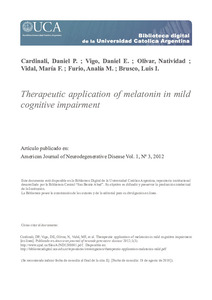Please use this identifier to cite or link to this item:
https://repositorio.uca.edu.ar/handle/123456789/1608| Título: | Therapeutic application of melatonin in mild cognitive impairment | Autor: | Cardinali, Daniel Pedro Vigo, Daniel Eduardo Olivar, Natividad Vidal, María Florencia Furio, Analía M. Brusco, Luis I. |
Palabras clave: | ENFERMEDAD DE ALZHEIMER; MELATONINA; BENZODIAZEPINAS; TEST NEUROPSICOLOGICOS; DETERIORO COGNITIVO LEVE | Fecha de publicación: | 2012 | Editorial: | e-Century Publishing | Cita: | Cardinali, D. P., et al. Therapeutic application of melatonin in mild cognitive impairment [en línea]. American Journal of Neurodegenerative Disease. 2012, 1 (3). Disponible en: https://repositorio.uca.edu.ar/handle/123456789/1608 | Resumen: | Abstract: Mild cognitive impairment (MCI) is an etiologically heterogeneous syndrome defined by cognitive impairment in advance of dementia. We previously reported in a retrospective analysis that daily 3 - 9 mg of a fast-release melatonin preparation given p. o. at bedtime for up to 3 years significantly improved cognitive and emotional performance and daily sleep/wake cycle in MCI patients. In a follow up of that study we now report data from another series of 96 MCI outpatients, 61 of who had received daily 3 - 24 mg of a fast-release melatonin preparation p. o. at bedtime for 15 to 60 months. Melatonin was given in addition to the standard medication prescribed by the attending psychiatrist. Patients treated with melatonin exhibited significantly better performance in Mini–Mental State Examination and the cognitive subscale of the Alzheimer’s disease Assessment Scale. After application of a neuropsychological battery comprising a Mattis´ test, Digit-symbol test, Trail A and B tasks and the Rey´s verbal test, better performance was found in melatonin-treated patients for every parameter tested. Abnormally high Beck Depression Inventory scores decreased in melatonin-treated patients, concomitantly with the improvement in the quality of sleep and wakefulness. The comparison of the medication profile in both groups of MCI patients indicated that 9.8% in the melatonin group received benzodiazepines vs. 62.8% in the non-melatonin group. The results further support that melatonin can be a useful add-on drug for treating MCI in a clinic environment | URI: | https://repositorio.uca.edu.ar/handle/123456789/1608 | ISSN: | 2165-591X | Disciplina: | MEDICINA | Derechos: | Acceso Abierto | Fuente: | American journal of neurodegenerative disease. 2012, 1 (3) |
| Appears in Collections: | Artículos |
Files in This Item:
| File | Description | Size | Format | |
|---|---|---|---|---|
| therapeutic-application-melatonin-mild.pdf | 448,74 kB | Adobe PDF |  View/Open |
Page view(s)
89
checked on Apr 30, 2024
Download(s)
52
checked on Apr 30, 2024
Google ScholarTM
Check
Altmetric
This item is licensed under a Creative Commons License

